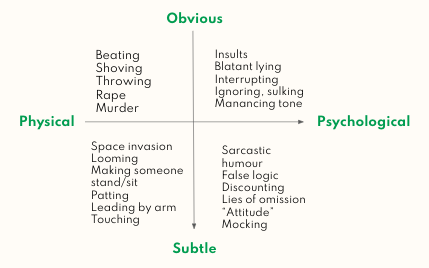Power Misuse & Respect at Work
The Respect at Work Bill is set to mandate respectful workplaces and hold leaders accountable. Are you ready?
Author
Philippa Richardson
Pip is Founder of The Circle Line, a Transactional Analysis psychotherapist, a former City litigator and a Head of Marketing in the property industry. She works with individuals, leaders and groups to help them function well in life and work, believing that we can all write our own life story.

The Respect at Work Bill packs a punch: set to make creating a positive work environment a legal duty and to hold leaders accountable. Some companies are already talking about "respect" at work. But we don't talk so much about "abuse" at work. Here's why we should.
In 2022 a ground-breaking new law was passed in Australia: it expressly prohibits hostile workplace environments and puts a new legal obligation on employers to proactively prevent sexual harassment.
Simultaneously, over in New South Wales two nurses died in quick succession, believed to be by suicide. They were allegedly being bullied at work. A criminal case has been filed against their employer; charged with failing to comply with their duty of care to the two nurses under work health and safety legislation. The Directors personally face criminal prosecution.
Hot on the heels, in the UK a new bill is currently being passed through the House of Commons. This new Respect at Work Act will make four serious changes. It will:
a) Create a new legal duty that employers must proactively create a positive work environment.
b) Enforce The Respect at Work Code - minimum standards of acceptable behaviour at work and for positive and respectful work environments.
c) Give new powers to the Equalities and Human Rights Commission to investigate workplaces where there is evidence of bullying and to take enforcement action; and
d) Enable workers to bring a claim related to bullying in the Employment Tribunal.
The world is finally becoming live to the existence of psychological power misuse at work.
We can no longer dismiss self-development as too “woke”, “soft and fluffy” or a “nice to have”. Especially if you're a company Director. We all need to become more aware of how our behaviour affects others. And to build the confidence to speak up for ourselves.
The time has come to truly appreciate the power imbalances in your workplace and the impact of leaders' behaviours.
Power Misuse
Imagine that you're sitting on a park bench in a sunny spot that I want to occupy. If I can take the place away from you, I will have manifested my power.
If I'm sufficiently strong, I can push you or lift you out of your spot. This is an example of crude physical power.
If I can get you out of your seat without using physical force I am using my psychological power. This depends on my capacity to ignite your energy to cause you to do what you don’t want to do.
All psychological power plays depend on obedience. I can intimidate or persuade you out of the seat. I can cause you to feel guilty and give up your seat to me. I can cajole or threaten you, or use the sheer volume of my voice. I can trick you or lie to you. I can entice you with a smile, or with a promise, or I can convince you that giving up your seat to me is necessary for national security.
Whatever my method, if I overcome your resistance to giving up your seat without using physical force, I have used my psychological power, which relies on obedience on your part probably through the creation of fear.
Leaders of companies have a lot of psychological power.
The Forms of Power Misuse
Power is all around us – we experience its use and misuse every day from the earliest days of our lives. Power has an impact on all organisations.
We spend our youngest years subject to the daily impact of other people’s power, so we quite naturally take oppressive or submissive roles as adults. The acceptance of power imbalances and misuse is in fact drilled into us through our life-long immersion in hierarchy and competition – both in our families and in the wider world.
All abuse is some kind of mis-use of personal power. An abuse of power takes three main forms:
Psychological
Words, tone or behaviours that undermine, damage or demean.
Physical
Any form of physical contact that is unwanted, rejected or forced.
Sexual
Any form of sexual activity that is unwanted, rejected or forced.
We may think of the word "bullying" when we think of power misuse. There is currently no statutory definition of bullying though The Respect at Work Act may change that. The Advisory, Conciliation and Arbitration Service defines bullying as “unwanted behaviour from a person or group that is either offensive, intimidating, malicious or insulting or an abuse or misuse of power that undermines, humiliates, or causes physical or emotional harm to someone.”
Identifying Power Misuse
We can identify all abuses of power in four simple ways:
Is it physical or psychological?
Is it subtle or obvious?

Ordinarily people, even in more oppressive environments, do not experience direct obvious physical or sexual power abuse. When they do, they usually know about it. It is never ok.
Most of the oppression or power misuse that employees experience is psychological. This can be emotional, verbal, or financial. Very often, it is subtle.
It's the tale of sexual shenanigans told at a drunken dinner by a senior partner, or your manager hushing you in front of your peers, or the boss teasing a new employee. If you're in a senior position, a position of power, the subtleties often pack more of a punch than you may realise.
We must all be alive to how we use and experience the use of personal power. Whether in personal or professional relationships, and whatever the context.
How We Can Help
At The Circle Line, we're very used to identifying power misuse, supporting those affected and helping them learn to speak up, and helping the mis-user to change. We're Transactional Analyst psychotherapists. We analyse transactions i.e. what goes on between (and inside) people. It's our bread and butter.
When we work with leaders, we focus on three key abilities:
Potency
Protection
Permission
When things go awry with a leader's concept of and ability to be Potent, rather than pushy, power misuse can ensue. When leaders grasp how to create an environment of Protection, power misuse becomes less likely to happen and more likely to be reported. With both these in place, the leader can give the employees the fullest Permission possible to bring the full extent of their talents - to together drive the company forward to greater heights.
If you'd like help with any of issues we explore in this article - see more information here, and do speak up: pip@thecircleline.co.uk
Written with thanks and acknowledgment to Claude Steiner: quoted from The Heart of the Matter, 2009